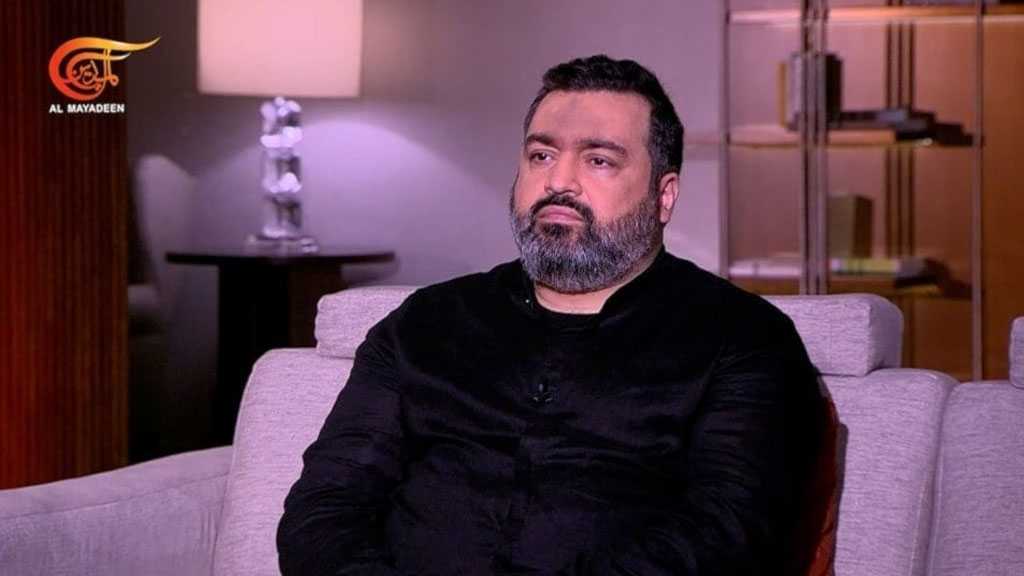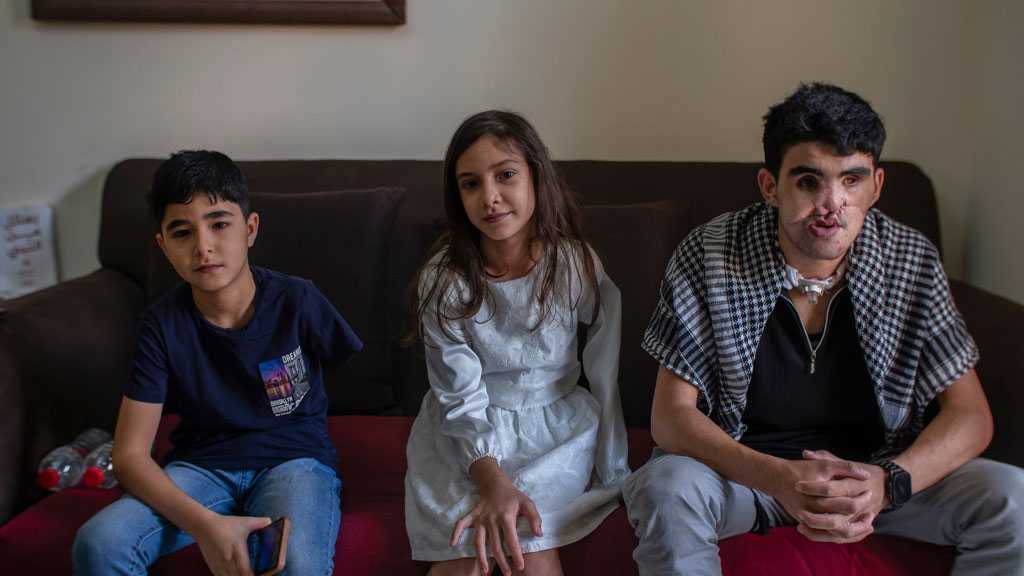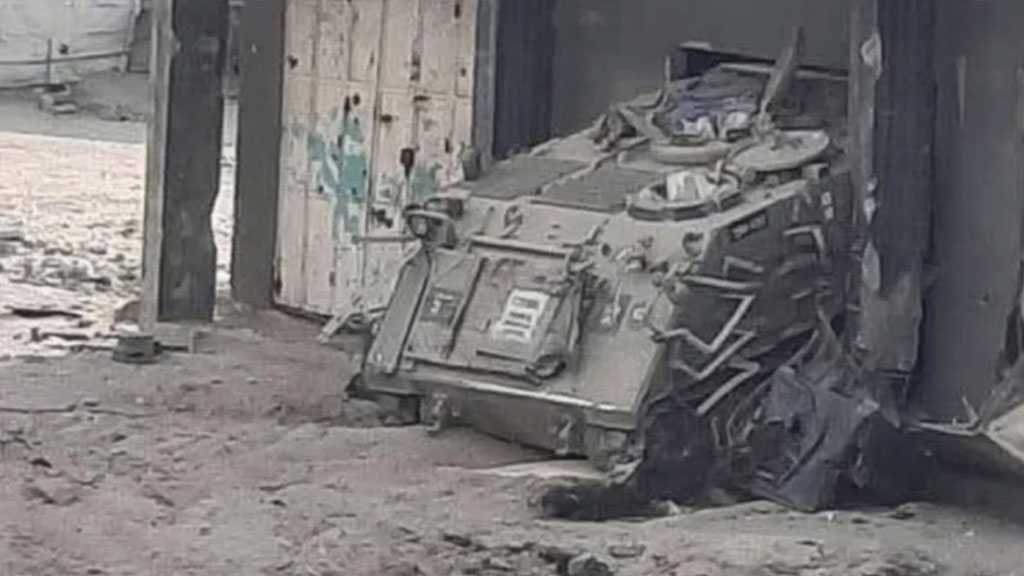Sayyed Nasrallah Through His Son’s Eyes: The Father, Spouse and Human

By Al Mayadeen English
In an interview for Al Mayadeen’s “Misk Al-Kalam”, Sayyed Jawad, the son of the Ummah’s Martyr Sayyed Hassan Nasrallah, spoke about the human legacy of his martyred father.
Opening his remarks, Sayyed Jawad Nasrallah affirmed that the Master of the Ummah’s Martyr is not really gone; rather, his presence has become more vibrant and evident.
“He is present in every thought, in every movement and stillness, not only at home or within the family, but also beyond,” Sayyed Jawad said, highlighting his father’s enduring influence.
Drawing on a religious perspective, Sayyed Jawad explained that some people’s denial and refusal to accept that Sayyed Nasrallah was martyred is merely an emotional reaction that detaches them from logic. However, he said, people will gradually return to accepting the reality in due time.
His martyrdom, ceremonial funeral wash
Sayyed Hassan Nasrallah’s son recalled that he received the news of his father’s martyrdom the same way everyone else did, that is, through television, when Hezbollah’s official statement was broadcast on Al Mayadeen’s screen, even though this was “a scenario I never liked, and I always prayed that he would live long”.
Reflecting on the early emotions upon learning that Sayyed Nasrallah was targeted, Sayyed Jawad described them as “nothing more than a shock. We were somewhat mentally prepared for the force of the strike, for the scale of the blow, for the Israeli announcement, for some of the details we began talking about that night: could it really be him or not? Could he be in that place or not?”
He added that “the nature of the security apparatus responsible for the Sayyed’s protection was compartmentalized, meaning that not everyone knew each other. So, informing us of the news was somewhat difficult, especially since we were isolated from any such contact”.
Sayyed Jawad recounted the thoughts that ran through his mind the moment he knew of his father’s martyrdom: “Where is he? Did they pull him out? Is he still in the facility?”
He noted that Martyr Sayyed Hashem Safieddine did not announce Sayyed Hassan Nasrallah’s martyrdom until after the body had been retrieved from the site. “Someone came, saw him with his own eyes, and called him [Sayyed Hashem] and told him: ‘I saw him’. So he prepared the statement”.
Sayyed Jawad continued, explaining that after Sayyed Safieddine called him, a young man, whom Sayyed Safieddine had mentioned, got in touch and told him that the body was either at a certain Hussainiya or in a nearby funeral facility. Sayyed Jawad said he went to the first location but found it empty, realizing they had likely moved to the mortuary. When he arrived there, he found his father and saw him lying out on the mortuary washing table.
Describing the first moments upon seeing the body of the Ummah’s Martyr, Sayyed Hassan Nasrallah, on the mortuary washing table, Sayyed Jawad said, “The first thing I looked at was his hands, to see whether it was asphyxiation or pressure. When I saw that they were relaxed, it eased my heart”.
Sayyed Jawad recalls how he remained calm and composed, telling himself, “I am my father’s son. When martyrdom hits us, we do not fall apart, never”.
Anticipating his own martyrdom
Sayyed Jawad revealed that in the final year leading up to his ascension as a martyr, Sayyed Nasrallah became increasingly aware that he was “on the path to martyrdom,” so he prepared him and his siblings for it. He remarked that the Sayyed chose not to speak of his premonition publicly, “not wanting to burden anyone with his concerns.” Stressing that from the beginning of the Al-Aqsa flood and up until the martyrdom of Fouad Shukr, his father carried the certainty of martyrdom.
Reflecting on what many considered a clear farewell from Sayyed during Martyr Fouad Shokor’s funeral, when he said, addressing the resistance leader, “For our martyr, we do not say goodbye, but rather see you soon, see you when blood triumphs over the sword, see you in martyrdom, see you alongside the beloved, Sayyed Jawad explained, “He had made up his mind. Those who know the Sayyed know that he never speaks merely for morale; he means every word he says.”
Regarding his father’s final meeting with his mother before his martyrdom, Sayyed Jawad recalled him telling her, “‘Here is where we part’. She asked, ‘Will I see you again, God willing?’ He answered, ‘No, this is the last time we meet.’ And three months before his martyrdom, he told my mother, ‘I feel this is the final period’”.
As for his last family gathering with his father, Sayyed Jawad said it took place in June 2024, in the presence of his grandfather and uncles, where the conversation was intimate, recollecting family moments and memories.
Childhood in Sharshabouk
Sayyed Jawad recounted a story his father had shared with him about his childhood in the Sharshabouk neighborhood in the Karantina area in Beirut. He recalled his father telling him that when the neighborhood kids wanted to play football, they had no money to buy numbered jerseys. So, they would get a can of paint, put on white undershirts, and paint the numbers themselves. Then the neighborhood kids would pray to God to help them survive the beating they’d get at home for ruining their shirts. Sayyed Jawad added that his father, alongside all the boys in the neighborhood, did this, and they were only 5 or 6 years old and played barefoot.
Speaking about winters in this neighborhood, Sayyed Jawad explained that his father loved the sound of rain on zinc roofing because it brought back memories of his childhood in Sharshabouk.
Sayyed Jawad came to cherish this same sound as it connected him to his father. “Whenever I’m somewhere and it starts raining, if there’s a hangar nearby, the sound of winter reminds me of him, that distinctive sound my father so loved,” he said.
He further emphasized that these humble beginnings became the foundation of the Sayyed’s character and shaped his compassion for the poor, the marginalized, and the oppressed.
As for his religious influences, Sayyed Jawad said that his father “often sat under the pulpits of Sayyed Mohammad Hussein Fadlallah and Sheikh Mohammad Mahdi Shamseddine, may God have mercy on them”.
Adding that, in his youth, Sayyed Nasrallah was initially drawn to the character of Sayyed Musa al-Sadr, explaining, “If you want to understand how someone built his character, you have to see from who he drew his love, inspiration and influence”.
The Sayyed, the avid reader
Sayyed Jawad described his father as “an excellent, voracious reader,” with an exceptional ability to retain information, so much so that you can ask him about the book he was reading as soon as he puts it down, and he will be able to answer your question immediately.
Despite his responsibilities, Sayyed Nasrallah would read at least one book every two days, on top of reports, correspondence, and news updates.
He pointed out another trait in him, saying, “For him, nothing was off-limits in reading or in questioning. He believed that knowledge, dialogue, and openness expand horizons. He even read his sister’s finance and management textbooks from university, along with literature, politics, memoirs of presidents, and even the writings of Zionist and American intelligence officials, because he wanted to understand their mindset. To him, no subject was forbidden”.
Sayyed Nasrallah was a “true democrat”, according to Sayyed Jawad, whereby you could talk to him about anything, ask him anything, disagree with him on anything, and he would explain. He was never authoritarian; on the contrary, he would always clarify and guide. He added that he used to guide him in selecting books, especially theological and doctrinal texts.
Sayyed Jawad underscored the great reverence Sayyed Hassan had for the Holy Quran, as he would encourage everyone to let the Quran be the first book they read, recalling, “He taught us that reading the Quran with certainty is different from merely reciting it beautifully. For him, the Quran was a guide for action, a way of life”. Another book Sayyed Hassan used to recommend was Imam Khomeini’s “Forty Hadiths”.
Sayyed Jawad also highlighted his father’s commitment to the movement pertaining to Imam Mahdi, saying that when they sat with Sayyed Nasrallah, they often “left politics aside to ask about the movement of [Imam Mahdi]”.
Sayyed Nasrallah, the father and husband
Sayyed Jawad spoke about his father, Sayyed Hassan Nasrallah, as a father. He said that when firmness was needed, he was decisive without ever resorting to physical punishment. “It was known that with one look from my father, we would freeze in place. For example, if he said, ‘that’s enough, Jawad,’ he never had to repeat himself”.
Sayyed Jawad described the kindness, guidance, and explanation that were dominant traits in the Sayyed’s parenting. “He never said no just to say no. Sometimes we would ask, ‘why not?’ in the sense that we’d agreed on what he said but demanded an explanation, which he would offer. This is one successful teaching technique, because even if you’re far from it, you would understand his reasoning. He’d explain why something was forbidden, inappropriate, or off-limits. That teaches you more”.
He emphasized that with his father, “there were no such things as forbidden topics, for any question we asked, he would answer. Sometimes we’d ask him why others consider certain questions inappropriate. He would say, ‘they’re mistaken. There’s a difference: some people ask to learn and understand, and others ask out of defiance’”.
Regarding the siblings’ relationships with the Sayyed, Sayyed Jawad noted that each had their distinct place, adding, however, that his sister Zeinab shared a special bond with him.
Sayyed Jawad recalled how his father would say, “I pampered all of you, each according to their age,” explaining that they never felt jealous of each other, “because he gave each of us enough affection and attention”.
Sayyed Jawad emphasized that his father had a cheerful spirit, but even in his humor, he never lost composure or self-esteem. “His words always fell perfectly into place, whether he was being serious or joking,” he said.
What distinguished him as a father, Sayyed Jawad added, was that “he taught us generosity and forgiveness, how to be tolerant, and how to deal with others, disciplining us on the basis of clarity and evidence”.
On the martyrdom of his brother, Sayyed Hadi, Sayyed Jawad said, “I don’t recall ever seeing him cry over Hadi, except when he first received the news and he secluded himself for some time,” adding, however, that whenever he came across anything related to the families of martyrs, “he would break down in tears. His tears and emotions flowed easily for them”.
Sayyed Jawad emphasized that at home, the Sayyed never brought up sectarian issues and that he would be deeply troubled whenever such matters were brought into public discourse.
On his parents’ relationship, Sayyed Jawad said, “We learned from him and my mother how to treat our wives. He embodied the height of ethics, kindness, and courtesy. We never once heard raised voices at home”.
“At the same time, my mother carried a heavy burden. She was his backbone and his haven, so he could stay mentally and intellectually focused on his mission,” he added.
Ultimate dream, Gaza Support Front
The biggest dream of the Ummah’s Martyr, Sayyed Hassan Nasrallah, was the liberation of al-Quds. Sayyed Jawad said that if someone does not devote their life, soul, blood, wealth, and children to this cause, then what is worth living for? He added that Sayyed Nasrallah was “truly Lebanese” because he sacrificed his son on the frontlines for the sake of the country.
When asked what he would say about those who wish the Sayyed had not opened the Gaza support front, thinking that perhaps he might still be alive otherwise, Sayyed Jawad replied that those who supported him in 2000, before that, and in 2006 should be with him in every battlefield he entered and every choice he made.
“Whoever truly supports him stands with him till the very end,” he asserted.
Bridging the people, politics and historical influence
Sayyed Jawad emphasized that by constantly being among the people and on social media, he worked to convey messages from the public to his father, especially on sensitive topics. On other matters, to ease the burden on him, he would relay messages to the martyr Sayyed Hashem Safieddine.
Regarding his father’s view of Lebanon’s political class, Sayyed Jawad said that his father always considered that “the one who knows them [the politicians] the best is Speaker Nabih Berri; he is experienced in dealing with them and knows the keys to them”.
Sayyed Jawad also highlighted that Sayyed Nasrallah greatly loved and respected the late Salim Hoss, [the former Prime Minister of Lebanon].
On historical figures who influenced Sayyed Nasrallah besides Imam Musa al-Sadr, Sayyed Abbas al-Moussawi and Imam Khomeini, and whose biographies he was keen to read, Sayyed Jawad confirmed that his father was deeply influenced by Ahl ul-Bayt [AS].



